SEO Project Management Process
Posted by Kishore 1 comments
Related articles:
The financial crisis is on the sky but if you look at the only business which is still booming is online marketing. People selling products online are not affected and still people are surging Internet, buying products and services with either credit cards or direct deposits.
You should know the right keywords and places where you should place the keywords. The content is still the king and the focus of both search engines and visitors is on content. You should also know that link building is also important along with just content.
There are many search engine marketing tools which are available for free and all you need is just image verification or sign up for free. You should also know that there are many other things like keyword spamming. More and more people just started spamming the keywords and started using them repeatedly so to avoid this search engines have not limited the keyword density. The exact percentage of keyword density is not revealed but the experienced webmasters say that you should not exceed 5% for a single keyword.
There are many tools which can scan your website for free and provide a list of relevant keywords and phrases for your keyword. You can then use these keywords so that you get good results. There is also one fact that you should always write with end user perspective. You should make sure that the content is easy to understand and you are not complicating the data.
The content should also be original and you should make sure that you are copying the data. You s\can also initially buy links from adword and sell products. People also compare the prices from different websites so you should also keep this thing in mind.
Another marketing solution is affiliates. You can allow other websites to sell your services and products and you can offer them part of your profits. This way you can sell more products and your popularity will also increase. Once a customer is satisfied with your services and products he would directly come to you next time and there would be no need for you distribute your profit.
There are also many other tools which will help you track the visitors and know the keywords which people are using to get to your website. You can concentrate for those keywords and achieve better ranks for them. This way you can get more sales and convert more visitors. Converting visitors means that you increase the number of people buying your service and products.
You should also go in forums and blogs of keywords in your niche and post and comment there. In your text you can also add a link to your website. This way you can have more traffic and backlinks. It has also been observed that when traffic from one website flows to your website they are targeted visitors and buy products and services. You should also employ social bookmarking services like Digg.
Posted by Kishore 0 comments
Related articles:
In order to ensure the acquisition and retention of potential customers and visitors, your web application must enable visitors to search and access your site with ease, via numerous search engines. The degree of friendliness that any web page has with popular search engines, determines the success of any web site.
This article deals with 10 effective tips that web designers should keep in mind while designing any web site application:
1. No web designer should make the mistake of designing the menu on the left-hand side of a web site/page. In case this is extremely inevitable, the designer should ensure that some of the rich keywords can be placed on the top or on top of the left hand menu. This approach ensures that the key words are the first words that any search engine spider’s crawl through first.
2. Any search engine gives higher weightage to the headlines rather than the actual content of the web page. In order to make effective use of this, your headline should always be made of rich keywords. However, since headline tags are usually quite large, these should be formatted to be smaller.
3. Each page of your web site should contain the title and description tags that are made out of good keywords and these should describe the content of the page effectively. An effective title should not be more than 9 words and the description should contain no more than 20 words. These restrictions will ensure that the search engine word limits are adhered to.
4. Flash is not read by most search engines so it would be wise for you to avoid using Flash as much as possible. In case the use of flash is not avoidable, flash content should be quite small in size.
5. When contemplating the use of graphics, you should ensure that all graphics are directly related to your article. Furthermore, you should try to make use of alternative tags while using graphics because search engines do not read content from graphical images.
6. Along with any image links, you should aim to use text links when linking with important information and make use of tags for your website content. Although spiders can follow image links, it is much easier for them to follow text links.
7. Search engines have restrictions when following web pages that contain frames. So, you must try to avoid the use of frames as much as possible. For some search engines that are actually able to read framed web pages, it might be difficult for spiders to interact with them.
8. Do not use complex tables while laying out your web page, try to use CSS instead.
9. Try and reduce your web page size by using java scripts and cascading style layouts as these will ensure that the download time of your web page is faster, thereby increasing your ranking.
10. Certain software applications add unnecessary scripting to your web page therefore, it is always safer to use HTML standard layouts.
If you follow the above web designing tips, you will be able to enjoy designing and developing a web site/page that in turn, makes browsing much easier to accomplish for both humans and search engines.
Posted by Kishore 1 comments
Related articles:
Ranking Position reports enable you to compare the relative performance in the natural listings of the search engines for different keyphrase types. As a result, they are useful for viewing the peformance of your SEO.
These tools are particularly necessary if you have a large keyword portfolio or international sales are important so you can track performance in different countries.
Before signing up for these tools, do note the following caveats:
The main SEO ranking position tools are:
Formerly Web Position Gold (WPG), now owned by and partially integrated with WebTrends.
Supplied by Caphyon. Uses Google API key.
High adoption client and agency side. Uses Google API key.
European tool, useful for international rank checking and includes sponsored listing reporting
Unlike the others, this is a free service, but can be used for smaller sites.
Posted by Kishore 0 comments
Related articles:
I use these tools regularly for all aspects of search engine marketing (SEM), but particularly keyphrase or keyword analysis for SEO. There are a wealth of free tools out there used by most involved with SEO and PPC, but my list has been expanded to not only include the SEO Keyword Analysis tools, but also many other tools.
See my Google keyword analysis tutorial for an illustration of the best way to use these tools.
I prefer the term keyphrase rather than the more common term keyword since both SEO and PPC perform better if you target phrases where keywords are in close proximity.
I have also compiled a listing of all the free Google tools for search marketing
1. Search engine keyphrase analysis tools
2. Keyword density SEO tools - for checking page effectiveness
These Search Engine Optimisation (SEO) tools analyse the number of occurrences of keyphrases / keywords on the page. They are useful for comparing your pages for SEO effectiveness against competitors.
3. Keyphrase / Keyword ranking position software
These software or web services report on your position in different search engines for different search terms. Be aware that these tools may contravene Search engines terms of service. Best known ranking tools include:
You should think through the following issues when using these tools:
4. Pay Per Click keyword tools
Here is my full listing of different types of SEO tools
Simpler analytics conversion tracking tools
Posted by Kishore 0 comments
Related articles:
The number of internet marketing tools launched over the past couple years has been staggering. Many of them are both free and highly valuable. SEO, which was once considered a bit of a seedy niche, has grown with search to become a mainstream marketing practice, with...
This article aims to highlight the best search engine marketing tools.
Keywords are at the core of search, so any effective SEO campaign starts with keyword research. My 4 favorite keyword research tools are
Given Google’s enormous search marketshare they have the most keyword data, though typically they have been less open than others with sharing data. Recently the Google AdWords Keyword Tool has started to show estimated search volumes using numbers (rather than graphs).
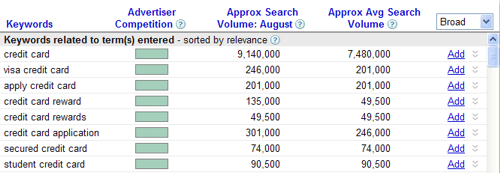
I partnered with the fine folks at Wordtracker to create a free keyword tool powered by their API. The SEO Book keyword tool acts like a meta search keyword tool, where the results are powered by Wordtracker and link to other related keyword tools.

Google Traffic Estimator is a tool which estimates the number of ad clicks that a particular keyword would get at a particular bid price. Given how ad clickthrough rate can vary greatly based on ad copy the estimates can be a bit rough, but this tool does give relative volumes AND values for keywords.

The addition of click cost estimates makes this a nice tool to submit a keyword list to in order to find out which keywords are the most valuable.
Microsoft Ad Intelligence is an Excel Plug In for Excel 2003 and Excel 2007.
It is similar to a combination of the Google AdWords Keyword Tool and the Google Traffic Estimator, with a couple additional features included.

If you are not using web analytics you are flying blind. Analytics data gives you the power to refine your strategy based on what is working and what is not. 3 of my favorite analytics tools are:
Google Analytics is a robust free analytics tool. The only concern I have with using it is that if you are profiting from a market inefficiency you might be revealing that inefficiency to the largest online ad network... which may then reveal it to other people. With their large search marketshare, their free keyword tools, industry benchmarking data, and the launch of Google Ad Planner (still in beta), Google Trends for Websites, and Google Insights for Search, Google is the leading source of keyword and market data for many online businesses.
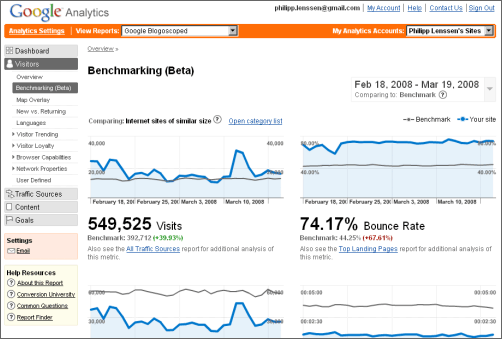
Clicky is an inexpensive web based analytics tool. In addition to being fairly feature rich, they also offer a white label service that allows webmasters to resell their analytics product.

Mint is an analytics program you can install on your server for a one time $30 licensing fee. It offers realtime data and has a wide array of extensions that display information in convenient panes, but is not as feature rich as the above options.

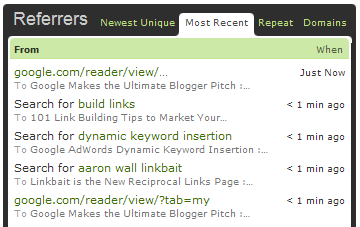
There are a wide array of analytics tools on the market. There are niche tools specifically for PPC campaigns like Optimize My Site and Tracking 202, as well as higher end offerings from companies like Omniture... finding the right tool for your needs is largely a function of defining your needs and budget, and if your budget is quite extensive it might make sense to program something in house.
While most successful SEO professionals pay more attention to traffic trends, conversions, and profits – it is still helpful to track where some sites rank for certain keywords. Tracking how sites move in the rankings for specific keywords gives you clues as to when search engineers change the weightings on things like domain authority, anchor text, and related words.
While Google Webmaster Central shows you some keywords you rank for, they do not show you the keywords you rank on page 5 or 6 for... just the keywords where you show up near the top of the search results often. Years ago Google had a useful search API, but more recently they have been using an Ajax API which does not work well with rank checkers.
My 2 favorite rank checkers are
This free rank checking tool is a Firefox extension which allows you to track how you rank in the search engines for a variety of keywords.

Starting at $99, Advanced Web Ranking is one of the more popular desktop search engine rank checking tools.
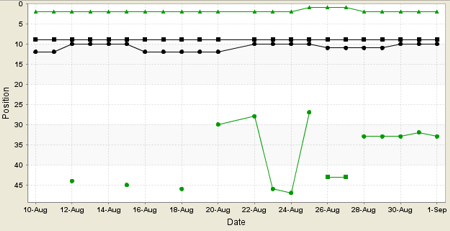
Link analysis is a field which has lost a bit of its importance over the past couple years. Google has clamped down on paid links, web directories, and article directories. At the same time more people are blogging online, and more webmasters have become aware to the field of public relations and the value of links. These combine to make it is much harder to catch up with a competitor if you are trying to duplicate their link building strategy.
To some degree link analysis has moved away from PageRank and anchor text toward analyzing news in the marketplace and understanding why stories are spreading (link analysis is evolving into media analysis and public relations). Here are 6 of my favorite link analysis tools
Google and Microsoft generally show rather limited link data to the public. Yahoo! Site Explorer shows a much deeper and more representative sampling of inbound link data.

SEO Link Analysis is a free Firefox extension that adds link anchor text, PageRank score, and if a link is nofollowed to Yahoo! Site Explorer results.
While Google tends to show a small sample of backlinks their Blogsearch is much better at detecting new links from blogs.
If you verify you own a website inside Google Webmaster Central, they will allow you to download a list of links pointing at your site. If you notice your rankings for a keyword are decent (but could be better) you could look through some of the people linking at your page and ask them to link at your page using more specific anchor text.
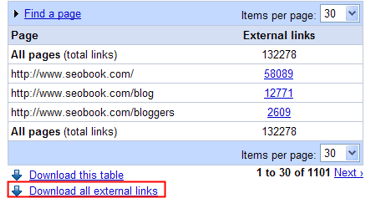
Xenu Link Sleuth crawls websites looking for broken links. This helps you keep your website maximally clean and functional by finding any broken internal links and any references to documents that are no longer online.
Advanced Link Manager is a paid software package starting at $199 which allows you to automatically track new backlinks obtained by competitors. It also crawls pages to find anchor text, if the link is using nofollow, and the PageRank score of the linking page.
We also created a free tool somewhat similar to Advanced Link Manager, named Backlink Analyzer. We have not updated our tool in a while though, and it is sorely in need of an update.
As search ad networks have become less transparent many PPC tools that did things like bid gap management have been rendered useless, while Google has built out a powerful AdWords API, an ad platform that allows you to bid per click or per conversion, and the Google AdWords Editor.
Google AdWords Editor is a free desktop tool advertisers can use to quickly edit their AdWords campaigns in bulk.
Google Website Optimizer is a free tool that makes it easy to test and improve your landing page and conversion process. Conversion Rate Experts offers a great overview article about how to take advantage of Website Optimizer and other conversion boosting tools.
Speed PPC is a paid desktop software program which makes it easy to generate many cross referenced ad campaigns and landing pages for geo-targeted keyword combinations. At $497 Speed PPC is not cheap, but if it is beyond your means and you are a good programmer then Zipcode Guy offers a free database of U.S. cities and zip codes.
My wife has build a free collection of useful web based PPC tools including a keyword list generator, a keyword list cleaner, a typo generator, a keyword wrapper, an ad group generator, and a ROI calculator.
Services like comScore and Hitwise have been around for many years for the people who could afford to buy their data, but their price points are north of what most people are willing to pay. Competitive research is one of the areas which has improved the most in the past few years, largely by a number of companies making products and tools at a more accessible price point. Here are 5 of my favorite competitive analysis tools.
Much of the consumer facing innovation in the competitive analysis industry stemmed from Compete.com launching with free basic analytics data, and using a credit based system that allowed anyone to buy competitive data for as little as $20. Since then they have changed their pricing model to one based on a flat monthly fee starting at $299 a month. Here are some of their top keywords for blogoscoped.com... and they offer the option to download hundreds more

Google Trends for Websites displays related sites, related search queries, and what countries a website is popular in. Google Insights for Search shows category related keywords, top search terms related to the keyword you entered, and top rising related keywords.
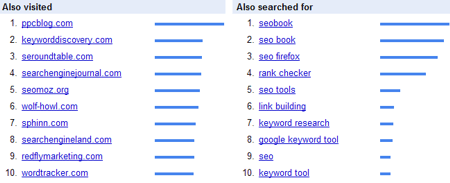
Microsoft Ad Intelligence, also covered in the above keyword tools section, offers top category based keywords and allows you to research keywords based on campaign association with competing advertisers (along with confidence estimates).
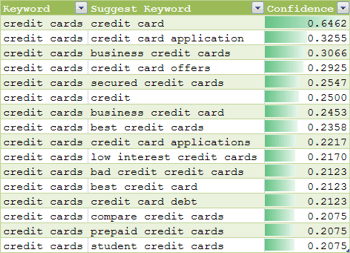
KeyCompete is a paid tool that lets you find what keywords competing advertisers are buying. This tool is especially powerful for affiliate marketers, where many of them resell the same product or service and need to get a baseline idea of what competitors are doing. SpyFu offers a similar service.
SEO Digger is similar to KeyCompete, but is free and works on showing what organic keywords a website is ranking for. URLTrends, which is currently undergoing redesign, is similar to SEO Digger.
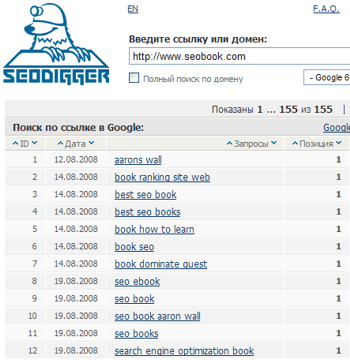
Please leave feedback and/or ask questions and I will try my best to respond to questions and feedback.
Posted by Kishore 0 comments
Related articles: